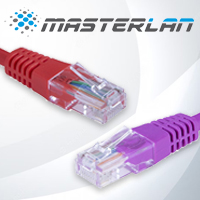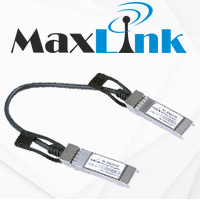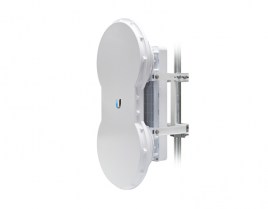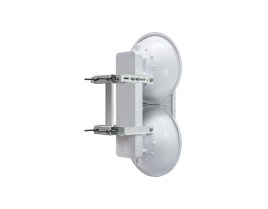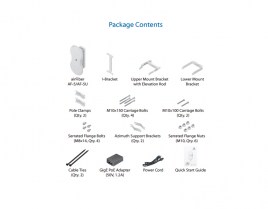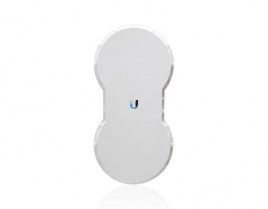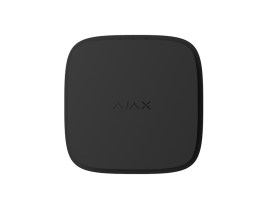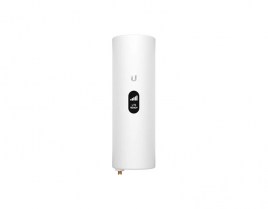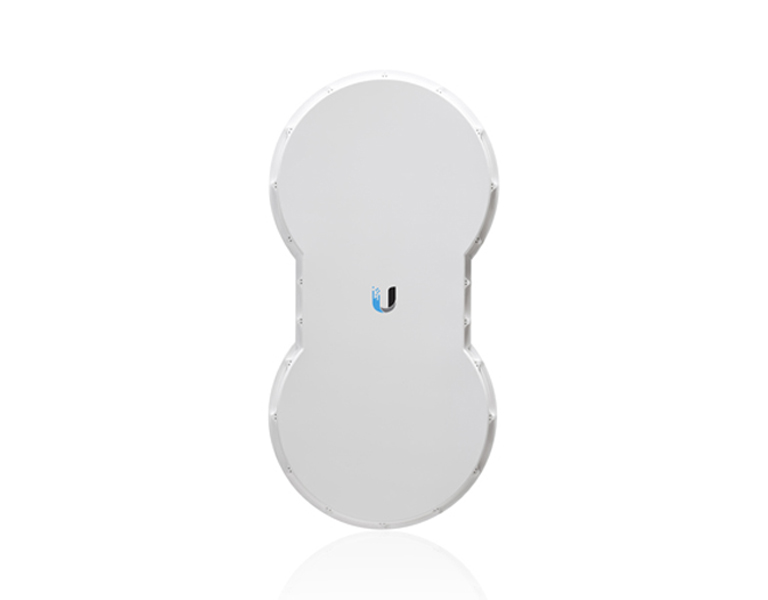
Ubiquiti AF-5 airFiber 5 Carrier Class Point-to-Point Gigabit Radio

- Description
- Specifications
- Downloads
- Reviews
Revolutionary Wireless Technology
Introducing airFiber®, a truly revolutionary Point-to-Point wireless platform from Ubiquiti Networks. Housed in a compact, highly efficient form factor, airFiber delivers amazing wireless gigabit+ performance, low latency, and long range. airFiber ushers in a new era in price-disruptive wireless technology ideal for carrier backhaul, building-to-building enterprise use, or public safety applications.
Efficient by Design
Every detail of airFiber was designed and engineered by the Ubiquiti R&D Team. From the silicon chip up to the innovative split-antenna architecture, the Ubiquiti R&D Team created airFiber to deliver superior throughput with efficiency. airFiber was purpose-built to create a high performance backhaul.
Plug and Play Deployment
Based on Ubiquiti’s innovative and intuitive airOS®, the airFiber Configuration Interface enables quick deployment. With installation efficiency in mind, the mechanical design allows easy installation by one person. A two-person installation crew can effectively install and align an airFiber link.
To fine-tune the alignment, the received signal levels can be conveniently accessed via any of these methods:
• airFiber LED display
• airFiber Configuration Interface
• Audio tone feature
Designed for Freedom
airFiber operates in worldwide, license-free, 5 GHz frequencies. Anyone around the world can purchase and operate airFiber without any special permits, paperwork, or added licensing costs. Users are free to locate, deploy, and operate airFiber practically anywhere they choose (subject to local country regulations).
Built for Speed and Range
airFiber delivers gigabit performance at 1.2+ Gbps for airFiber AF-5. To put this in perspective, airFiber can transmit a 100 MB file in less than a second. Rivaling common broadband providers, airFiber download speed is up to 100x faster. With speed and throughput surpassing conventional wired backhauls, airFiber prevails over expensive and labor-intensive wired infrastructures.
Innovative Proprietary Modem Technology
Ubiquiti’s innovative proprietary modem technology was purpose-built to address the specific challenges of outdoor, PtP (Point‑to-Point) bridging and high-performance network backhauls. Every aspect of the radio has been carefully simulated and designed to optimize range, speed, and latency performance in the harshest RF noise environments.
Synchronous Data Transmission and Reception
Conventional wireless standards impose a latency by having to receive a packet before a packet is transmitted. airFiber can transmit data synchronously without any wait time. airFiber features traditional TDD and FDD modes of operation in addition to the proprietary Hybrid Division Duplexing (HDD) mode, which provides a breakthrough in range and spectral efficiency performance.
Based on the ranging algorithm built into the air protocol, the airFiber radios use patent-pending HDD technology to calculate the propagation delay and know when each radio can transmit and receive, so they send packets in precise synchronization. Packet transmission latency is virtually eliminated.
Innovative Dual-Antenna
Architecture airFiber features a dual-independent, 2x2 MIMO, high-gain reflector antenna system. Separate yet integrated transmit (TX) and receive (RX) antennas help extend link budgets by eliminating the extra RF losses caused by the switches or duplexers required in systems with common TX/RX antennas.
Network Management
airFiber supports a variety of features to help you manage your network:
• Network management options A choice between the greater security of out-of-band management and the convenience of in-band management.
• SNMP support Full SNMP support to aid in network management.
• Local and remote airFiber status information Available on the Main tab of the airFiber Configuration Interface.
The mid-band model, AF-5, features the popular mid-band frequencies, which are freely used in many parts of the world.
Superior Processing
Ubiquiti Networks introduces our proprietary INVICTUS™ core communications processing engine. The speed, power, and efficiency of this integrated circuit enhances the performance of the airFiber AF-5.
Efficient Use of 5 GHz Band
airFiber AF-5 features 1 MHz center channel resolution with market-leading Power Envelope Tracking technology. The airFiber AF-5 accurately and continuously controls transmit power relative to the band edge. The power level automatically tracks to optimize performance near band edges, allowing you to choose the part of the band with the least interference.
Long-Range Links
Newly developed for the airFiber AF-5, the patent-pending xRT feature uses an innovative, adaptive multi-channel coding scheme to enhance radio transceiver performance, thereby maximizing your link budget and spectrum utilization – while still maintaining regulatory compliance. This results in links that can span distances from 10 m up to 100+ km.
Quick and Easy Installation
The unique sliding-clamp design of the airFiber AF-5 allows mounting hardware to be pre‑assembled prior to installation – no more dropped screws at the top of the tower. As an added convenience, the drop-in cradle mount design allows the installer to attach mounting hardware to the pole without having to support the weight of the airFiber radio during installation.
Radio Alignment Display
Newly designed for the airFiber AF-5, the Radio Alignment Display (RAD) makes aiming quicker and easier. The dual, calibrated signal strength indicators display the actual signal strength on the local and remote airFiber radios in real time. The comprehensive array of radio status indicators display the following:
• GPS synchronization status
• Master/slave mode
• RF link status
• RF overload warning
• Current modulation mode
• Link activity and speed for wired management and data ports
| Caution! According to current Greek Legislation, of N.F.B.A.R. and the provisions of the P.D. 98/2017 the lawful use of this product in the frequency band 5470 – 5725MHz, provides for a maximum transmit power of 1 W e.i.r.p. At this maximum power the output power of the transmitter and the gain of the antenna are both taken into account. Responsible for spectrum surveillance is H.T.P.C. This product is CE marked, P.D. 98/2017 This product is intended for outdoor use. |
| Warranties - Returns: | |
| Money Return: | Repair - Replacement: |
| 20 days | 24 months |
| Specifications | |
| Mechanical | |
| Dimensions | 938.4 x 468.4 x 281.4 mm |
| Mounting | Pole mount kit (Included) |
| Weight | 16 kg (Mount included) |
| Wind Loading | 863 N @ 200 km/h (194 lbf @ 125 mph) |
| Wind Survivability | 200 km/h (125 mph) |
| Hardware | |
| Networking interface | (1) 10/100/1000 MbE port (1) 10/100 MbE port |
| Auxiliary Port | (1) RJ-12, alignment tone port |
| Power method | Passive PoE |
| Power supply | 50V, 1.2A PoE GigE adapter (Included) |
| Supported voltage range | +42—58V DC |
| Max. power consumption | 40W |
| Operating temperature | -40 to 55°C |
| Certifications | CE, FCC, IC |
| System | |
| Maximum Throughput | 1.2+ Gbps |
| Maximum Range | 100+ km (Dependent on Regulatory Region) |
| Packets per Second | 1+ Million |
| Encryption | 128-Bit AES |
| Uplink/Downlink Ratio | 50% Fixed |
| Radio Frame Synchronization | GPS |
| RF | |
| Operating frequency | 5470 - 5600 MHz, 5650 - 5850 MHz (FCC 15.247, 15.407, IC RSS 210) 5470 - 5875 MHz (ETSI EN 301 893, EN 302 502) 5470 - 5950 MHz (Other Regions) |
| GPS | GPS Clock Synchronization |
| EIRP | ~50 dBm *Dependent on regulatory region and frequency band. |
| Frequency accuracy | ±2.5 ppm without GPS synchronization ±0.2 ppm with GPS synchronization |
| Channel bandwidth | 10/20/30/40/50 MHz |
| Modulation | 1024QAM MIMO 256QAM MIMO 64QAM MIMO 16QAM MIMO QPSK MIMO ½ Rate QPSK xRT ¼ Rate QPSK xRT |
| Gain TX RX |
23 dBi 23 dBi |
| Beamwidth | 6° |
| Front-to-back ratio | 70 dB |
| Polarization | Dual-slant |
| Cross-polarity isolation | > 28 dB |
| LEDs | |
| System | (12) Status LEDs: Data port pink/activity Data port speed Management port link/activity Management port speed GPS synchronization Master/slave Link status Modulation mode 0.25x to 4x, 6x, 8x, 10x (unlabelled), overload Remote and local displays (Calibrated signal strength) |
RELATED PRODUCTS
YOU HAVE SEEN RECENTLY
















